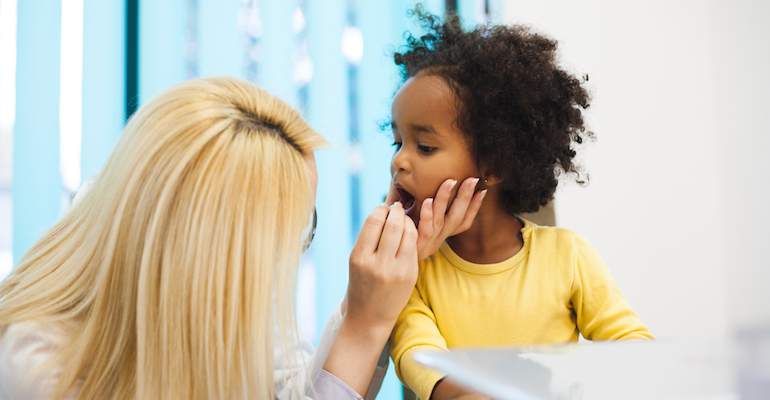Who has to know my child was adopted?
The only people who have to know your child was adopted are those who will provide medical or dental treatment. When you first visit the pediatrician or dentist, make sure the child’s file carries a prominent note about adoption, with as much information about ethnic background and birth-family medical history as you can find. If you change doctors, see that this information is transferred. Your child’s pre-adoption background affects what a doctor will look and test for. A pediatrician who sees two white parents with a light-skinned African-American child may not think to screen for sickle-cell anemia, for example, while a Norwegian-American child with a Jewish parent could undergo unnecessary testing for Tay-Sachs.
Some families who have adopted transracially report that, when they have taken their child to the emergency room, they have been asked to prove that they are the parents and can authorize treatment. If you and your child are visibly different, tuck a copy of the adoption decree in the bottom of your wallet. With luck, you’ll never need it.
How much privacy should my child have?
Children who have been adopted have the right of privacy. Privacy is not the same as secrecy. A secret is something that is kept from someone to whom the information pertains. Privacy involves sharing personal information only with people who have a relevant need to know. For example, if a child has a birth mother who was an alcoholic, that fact is important information to give the child’s pediatrician, who can be aware of signs of fetal alcohol syndrome or fetal alcohol effect, while maintaining professional confidence. It isn’t information that needs to be shared with other people, however, including close family members. The adoptee might choose to share that information, but it is his choice — not the choice of his adoptive parents. Once information is given away, it’s out — no one can control how it spreads.
It’s important that kids know it’s OK not to answer questions. Parents can demonstrate this when a friend or stranger intrudes with a question. A polite “We don’t care to discuss it” is fine. Lois Melina, an adoptive parent who has been writing and lecturing about adoption for 30 years, says: “I’m quite willing to answer people’s questions about the adoption process, the practices of different agencies, our reasons for adopting, and how my children reacted to what was a major change in their life. I consider information to be private if it refers to a child’s genetic and social history. My rule of thumb: Would you readily share that information about yourself?”
Do I need to tell the school?
Our families are divided on whether to tell their child’s school about the child’s adoption. Many parents say, yes, they must inform the school and teacher that their child was adopted. The subject will come up — during the ubiquitous family-tree assignment, or through thoughtless comments made by kids and adults — so they feel that it’s best to prepare staff to handle such situations when they arise. Others feel that adoption is private, a family matter, and not relevant where school is concerned. They do not want their child singled out for societal misconceptions (“He has separation anxiety because he was adopted”). They feel that when a child is older, it is his or her choice to tell or not to tell.
Some of our families have compromised by leaving the fact of the child’s adoption out of the formal school record, but telling the teacher informally at the beginning of the school year, until the child is old enough to make the decision him- or herself.
Straight talk: If you have asked your school to provide English as a Second Language tuition for an internationally adopted child, or have asked for Special Education screening because of a child’s past, the adoption history will be part of the child’s official record. After the services have been provided, you can ask for the information to be removed from the file.
How do I answer questions about adoption?
Our families report a common set of questions heard after an adoption. How you answer those questions will help a child learn to explain adoption while guarding his or her privacy.
- What do you know about his real parents? We are his real parents now. Do you mean his birth parents?
- Her birth mother was a teenager, right? We’re keeping information about her birth parents private for now.
- How could anyone give up such a beautiful child? His birth mother decided that she couldn’t raise any child right now.
- I thought it was impossible to adopt a newborn these days. How many years did you have to wait? Adoption is more common than you realize. Most families adopt in less than two years.
- Adoption costs a fortune, right? How did you afford it? Adoption is less expensive than you might think, and well within the reach of many families. I’d be glad to talk to you about it if you’re interested.
- Aren’t you worried that his birth parents will try to take him back? No. We’re his family by law now.
- Don’t you still wish you could have children of your own? He is our own.
- Will she speak Spanish? (Chinese? Russian?) She’s a baby. She doesn’t speak any language yet.
- Are you planning to tell her that she was adopted? Yes.


